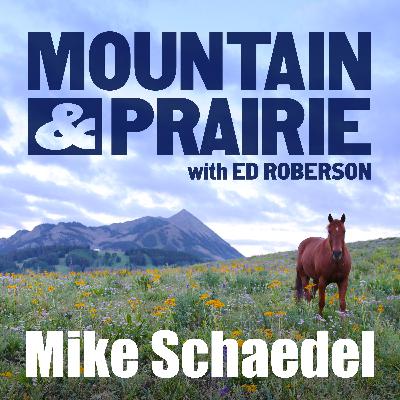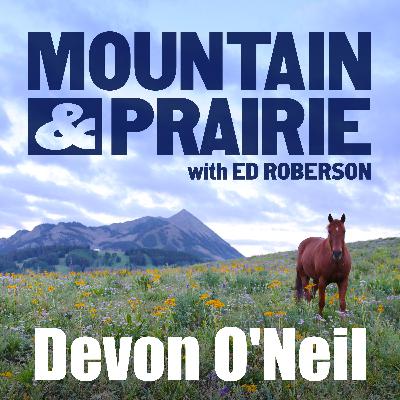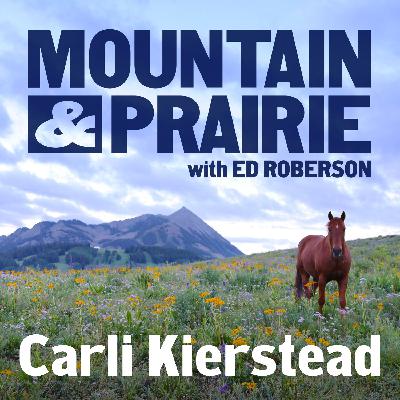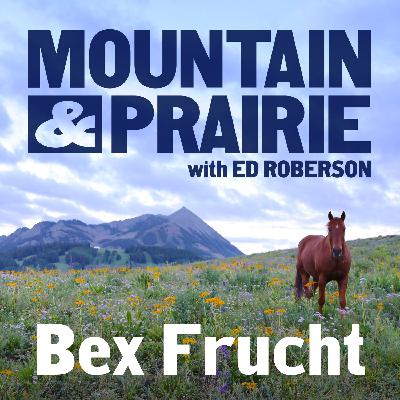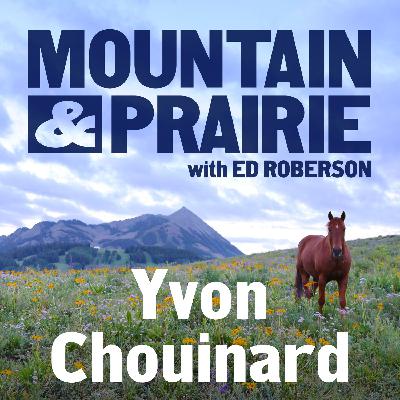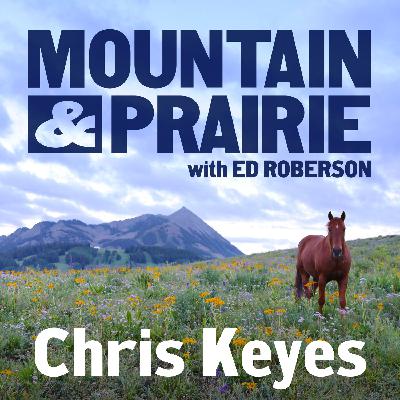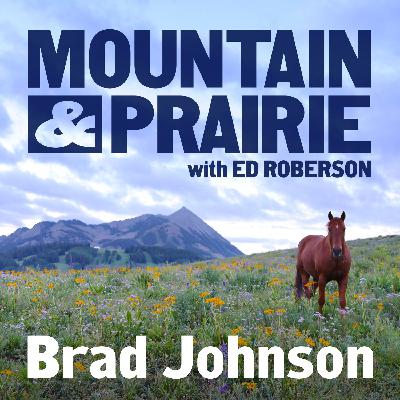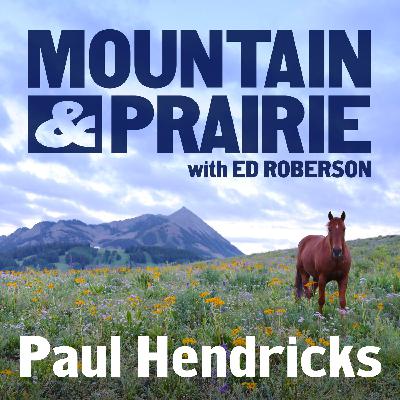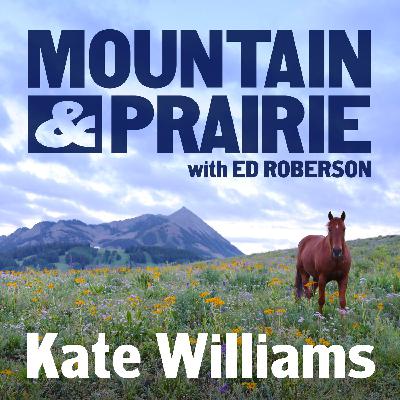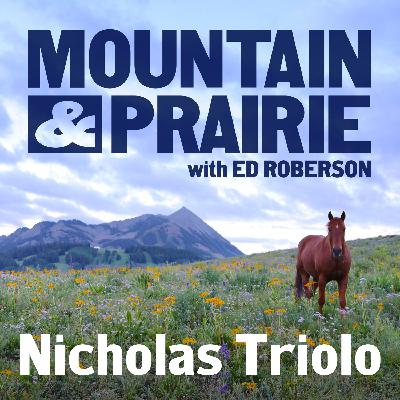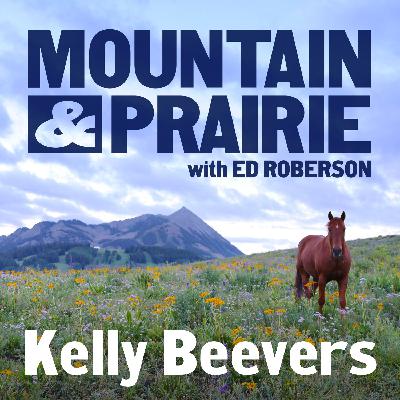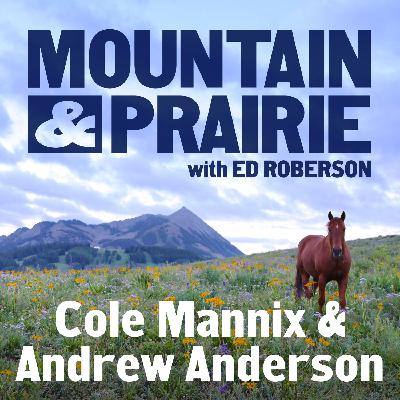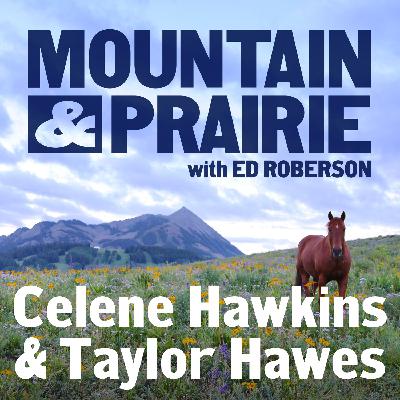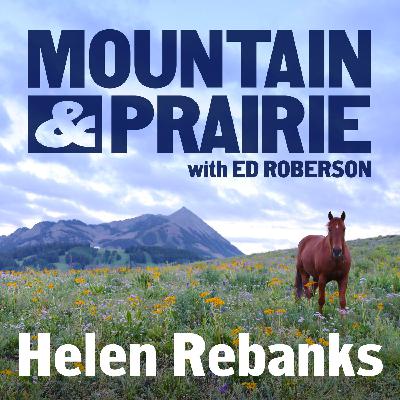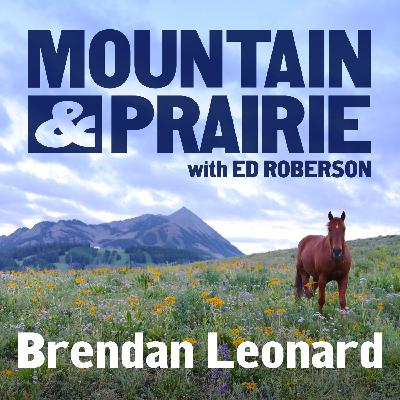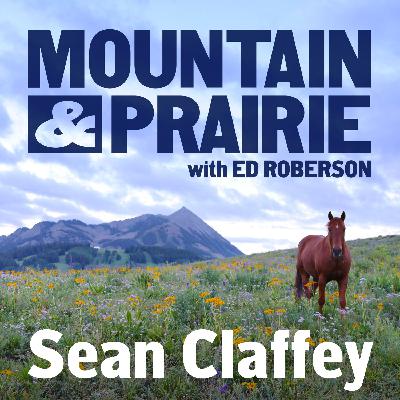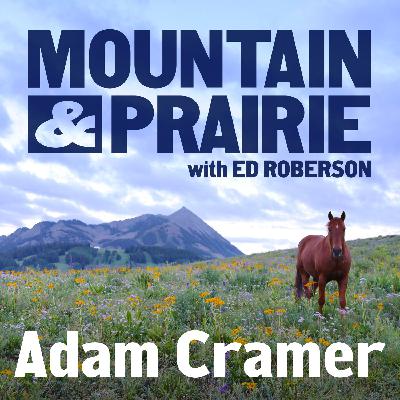Discover Mountain & Prairie with Ed Roberson
Mountain & Prairie with Ed Roberson

Mountain & Prairie with Ed Roberson
Author: Ed Roberson
Subscribed: 317Played: 11,304Subscribe
Share
© Mountain & Prairie Media
Description
Mountain & Prairie is a podcast about the people shaping the future of the American West—its land, communities, and culture.
•
Hosted by conservationist Ed Roberson, it features thoughtful, down-to-earth conversations with fascinating people doing meaningful work in the American West and beyond: conservationists tackling environmental challenges, authors and historians preserving the West's stories, artists and entrepreneurs building vibrant rural economies, athletes testing the limits of body and mind, and more.
•
Each episode explores their journeys, lessons learned, and the values that guide their work—offering listeners fresh insight, grounded optimism, and a deeper connection to this remarkable region.
•
Hosted by conservationist Ed Roberson, it features thoughtful, down-to-earth conversations with fascinating people doing meaningful work in the American West and beyond: conservationists tackling environmental challenges, authors and historians preserving the West's stories, artists and entrepreneurs building vibrant rural economies, athletes testing the limits of body and mind, and more.
•
Each episode explores their journeys, lessons learned, and the values that guide their work—offering listeners fresh insight, grounded optimism, and a deeper connection to this remarkable region.
291 Episodes
Reverse
Today's episode is a bit of a departure from the usual format. I'm re-sharing a recent conversation I had on my friend Brendan Leonard's new podcast, My Favorite Things. I'm sure most of y'all are already familiar with Brendan's work, but for those of you who aren't, he's an author, illustrator, filmmaker, and creator of Semi-Rad. Brendan's new podcast is built around a simple but fascinating premise: conversations about the books, films, art, and creative works that have helped shape a person's life and career. In this conversation, we spend less time on what I do, and more time on what's influenced how I think and live — from Theodore Roosevelt and Sebastian Junger to a Winslow Homer painting and a movie that's been oddly entertaining and instructive over the years. (I bet y'all can guess the movie.) There are already several excellent episodes live featuring thoughtful, interesting people, and Brendan has created something both entertaining and instructive with this podcast. If you enjoy this conversation, I'd encourage you to subscribe, explore the rest of the episodes, and share the show with any of your friends who might enjoy it. Thanks so much for listening and here's my appearance on My Favorite Things. --- My Favorite Things: Apple, Spotify, YouTube Episode Website Semi-Rad.com --- TOPICS DISCUSSED: 2:10: Background — Mountain & Prairie, family, and the "strenuous life" 5:00: Favorite Thing #1 — Jimmy Buffett liner notes 11:30: Favorite Thing #2 — The Rise of Theodore Roosevelt 20:00: Favorite Thing #3 — Winslow Homer's The Gulf Stream 28:15: Favorite Thing #4 — Tribe by Sebastian Junger 39:30: Favorite Thing #5 — Road House 52:15: Closing reflections --- ABOUT MOUNTAIN & PRAIRIE: Mountain & Prairie - All Episodes Mountain & Prairie Shop Mountain & Prairie on Instagram Upcoming Events About Ed Roberson Support Mountain & Prairie Leave a Review on Apple Podcasts
Mike Schaedel is the Western Montana Forest Restoration Director for The Nature Conservancy, where he leads some of the most ambitious and collaborative forest restoration work happening anywhere in the West. Based in Missoula, Mike works at the intersection of science, community partnerships, and land stewardship—helping restore fire-adapted forests, reduce wildfire risk, and improve the health and resilience of landscapes across the region. Mike's career path is super interesting and anything but traditional. He grew up in Portland, fell in love with the mountains through rock climbing, and eventually landed in Missoula, where the combination of wild landscapes and a rich literary community drew him in. After earning an undergraduate degree in creative writing, he found his way into forestry and fire ecology through conservation corps work, hands-on restoration experience, and a graduate program focused on forest dynamics and fire. In this conversation, Mike offers a clear overview of how Western Montana's forests came to look the way they do today—shaped by millennia of tribal burning, transformed by railroad-era land grants and industrial logging, and altered further by a century of fire suppression. He explains why effective restoration now depends on combining mechanical thinning with prescribed fire and on working across ownership boundaries with partners ranging from local communities to tribes and federal agencies. We also discuss some of the innovative collaborative efforts underway in the region, as well as a memorable story of a prescribed burn that came together through quick problem-solving and deep trust. This is a rich, informative, and hopeful conversation about what it takes to restore forests at scale—and why the future of these landscapes depends on both ecological understanding and strong community partnerships. Enjoy! --- Michael Schaedel, Western Montana Forest Restoration Director Reserved Treaty Rights Lands Program: The Power of Partnership Complete episode notes and links: https://mountainandprairie.com/mike-schaedel --- This episode is brought to you in partnership with the Colorado chapter of The Nature Conservancy and TNC chapters throughout the Western United States. Guided by science and grounded by decades of collaborative partnerships, The Nature Conservancy has a long-standing legacy of achieving lasting results to create a world where nature and people thrive. During the last week of every month throughout 2025, Mountain & Prairie will be delving into conversations with a wide range of The Nature Conservancy's leaders, partners, collaborators, and stakeholders, highlighting the myriad of conservation challenges, opportunities, and solutions here in the American West and beyond. To learn more about The Nature Conservancy's impactful work in the West and around the world, visit www.nature.org --- TOPICS DISCUSSED: 3:02 – Intro, Mike's love for Missoula 6:04 – Getting a creative writing degree 8:21 – And fighting back into forestry 12:26 – Early writing influences 13:39 – Switching sides of the brain 15:32 – First job out of grad school 20:08 – And that work now 23:38 – Checkerboard landownership 33:04 – Conservation accomplishment 34:56 – Fitting in forest health 39:33 – Fire scars 45:52 – The Big Burn 52:59 – Fire playing a beneficial role 58:51 – And the role mill workers play 1:02:03 – Projects down the pipeline 1:12:00 – Book recs 1:13:49 – Parting words --- ABOUT MOUNTAIN & PRAIRIE: Mountain & Prairie - All Episodes Mountain & Prairie Shop Mountain & Prairie on Instagram Upcoming Events About Ed Roberson Support Mountain & Prairie Leave a Review on Apple Podcasts
This month marks ten full years of my bimonthly book-recommendations project—a decade of weird little paragraphs about the books that grab my scattered attention. Whether you've been here since the beginning or signed up five minutes ago, thank you. I'm still baffled anyone reads these things, but I'm grateful all the same. To mark the occasion, I recorded a late-night solo episode from The Shed, diving deeper into each of my September & October picks: why I chose them, what stayed with me, and the sometimes-unexpected lessons I gleaned from each of them. Or you could just describe it as a guy sitting in his garden shed talking to himself. Your choice. You can read all of the recommendations here, or, if you're clamoring to receive more emails, you can sign up for the list here. Thanks for listening, thanks for reading, and here's to 10 more great years of great books. – September & October 2025 Book Recommendations Ed's Bimonthly Book Recommendations Sign up for the list – BOOKS DISCUSSED: 00:00 — Intro + 10 years of book-rec emails 05:45 — Burn by Peter Heller 11:00 — Jaber Crow by Wendell Berry (related rec) 11:45 — The Way Out by Devon O'Neil 17:10 — Simple Fly Fishing by Yvon Chouinard 21:50 — Pheasant Tail Simplicity by Yvon Chouinard 25:40 — Little Woodchucks by Nick Offerman 29:20 — Dirtbag Billionaire by David Gelles 35:00 — Shoe Dog by Phil Knight (related rec) 35:55 — Apple in China by Patrick McGee 40:45 — When McKinsey Comes to Town (related rec) 42:10 — The Devil's Hand by Jack Carr 46:15 — Closing thoughts --- ABOUT MOUNTAIN & PRAIRIE: Mountain & Prairie - All Episodes Mountain & Prairie Shop Mountain & Prairie on Instagram Upcoming Events About Ed Roberson Support Mountain & Prairie Leave a Review on Apple Podcasts
Devon O'Neil is a journalist, author, and longtime friend of mine whose new book "The Way Out: A True Story of Survival in the Heart of the Rockies" is one of the best pieces of outdoor nonfiction I've read in years. The book tells the harrowing true story of a backcountry ski trip near Leadville, Colorado, that turned tragic—and the years-long process of understanding what really happened, and how a mountain town wrestled with loss, resilience, and the complicated relationship we all have with risk and wild places. It's gripping, deeply reported, and beautifully written—equal parts survival epic, community portrait, and meditation on how we find meaning in the aftermath of tragedy. Devon has spent more than two decades as a writer and reporter based in Summit County, Colorado, covering everything from adventure sports and avalanches to the cultural and emotional undercurrents of life in mountain towns. Before turning his attention to this book project, he worked in newspapers, wrote for Outside, Men's Journal, and ESPN.com, and somehow managed to balance all of that with being a hardcore athlete and a dedicated dad and husband. He's one of those rare writers whose empathy and endurance match the people that he writes about. In this conversation, Devon and I dig into the story behind "The Way Out"—how he first heard about the tragedy, earned the trust of a close-knit community, and spent years piecing together a complete and compassionate account. We talk about the ethical tightrope of telling other people's hardest stories, how his own brushes with danger shaped his perspective on risk, and what this project taught him about the fine line between adventure and recklessness. We also get into his childhood growing up on a sailboat in the Virgin Islands, his evolution as a journalist and athlete, and the hard-earned wisdom that comes from spending a lifetime chasing stories in the mountains. "The Way Out" is available now wherever you get your books, so follow the links in the episode notes to grab your copy. Big thanks to Devon for the chat, and thank you for listening. Enjoy! --- Devon O'Neil "The Way Out" by Devon O'Neil Full episode notes and links: https://mountainandprairie.com/devon-oneil/ --- TOPICS DISCUSSED: 2:23 – Intro and finding The Way Out story 6:59 – Making people comfortable 11:10 – The story in Devon's words 16:29 – Mountain town people 20:48 – Lifestyle overlaps 24:20 – Devon's own accidents 30:10 – It's all great until someone gets hurt 33:03 – The bonds of risk 35:18 – Adjustments 39:22 – Growing up on islands 43:43 – How Devon got to Colorado 47:34 – Pros and cons of different types of writing 51:22 – Book writing advice 55:42 – Not just about getting it right 1:00:09 – Book and writer recs --- ABOUT MOUNTAIN & PRAIRIE: Mountain & Prairie - All Episodes Mountain & Prairie Shop Mountain & Prairie on Instagram Upcoming Events About Ed Roberson Support Mountain & Prairie Leave a Review on Apple Podcasts
Carli Kierstead is the Forest Program Director for The Nature Conservancy in Wyoming, where she leads efforts to understand and restore some of the West's most critical—and often overlooked—ecosystems. From beetle kill and wildfire to drought, Wyoming's forests face a range of challenges that ripple far beyond the state's borders. These high-country forests are the headwaters of several major river basins, providing water to millions of people across the American West. In this conversation, Carli and I dig into the past, present, and future of Western forests—how management philosophies have evolved over the decades, what's threatening their health today, and what can be done to make them more resilient in a changing climate. We talk about her team's groundbreaking work using snowtography—a deceptively simple but powerful way to study how forest structure affects snowpack and water supply—and how those findings could help guide future restoration across the Colorado River Basin. Carli also shares her personal journey from growing up in San Diego to finding her calling in Wyoming's wide-open landscapes, her insights on collaboration and trust-building in conservation, and a few book recommendations that shaped her path. It's a hopeful, science-grounded conversation about water, forests, and how collaboration can shape a more resilient future for the West. Thanks for listening, hope you enjoy! --- Carli Kierstead Wyoming forests + TNC Snowtography short film Full episode notes and links: https://mountainandprairie.com/carli-kierstead/ --- This episode is brought to you in partnership with the Colorado chapter of The Nature Conservancy and TNC chapters throughout the Western United States. Guided by science and grounded by decades of collaborative partnerships, The Nature Conservancy has a long-standing legacy of achieving lasting results to create a world where nature and people thrive. During the last week of every month throughout 2025, Mountain & Prairie will be delving into conversations with a wide range of The Nature Conservancy's leaders, partners, collaborators, and stakeholders, highlighting the myriad of conservation challenges, opportunities, and solutions here in the American West and beyond. To learn more about The Nature Conservancy's impactful work in the West and around the world, visit www.nature.org --- TOPICS DISCUSSED: 2:34 – Intro and Wyoming forest health 7:16 – Beetle issues 8:30 – Why forest health? 12:35 – Economic benefit of forests 16:28 – Wyoming's claim to water 17:10 – Snowtography 23:18 – Lessons from the snow 27:33 – On the ground impact 33:53 – How it scales 40:42 – Relationship building 46:08 – The tendrils of the Colorado River Basin 46:46 – Carli's environment obsession 52:01 – How to build a relationship 55:10 – Book recs 58:38 – Last thoughts --- ABOUT MOUNTAIN & PRAIRIE: Mountain & Prairie - All Episodes Mountain & Prairie Shop Mountain & Prairie on Instagram Upcoming Events About Ed Roberson Support Mountain & Prairie Leave a Review on Apple Podcasts
Bex Frucht is a force of nature—a storyteller and community builder whose work blends performance, land, and small-town life in the American West. Based in Livingston, Montana, she's the founder of TMI Live, a storytelling series that celebrates vulnerability, humor, and human connection, and for the past three years, she's been the "vibe steward" of the Old Salt Festival, where her talent for bringing people together has become legendary. Whether she's hosting a show, coaching storytellers, or emceeing a fundraiser, Bex radiates generosity, intelligence, and positivity in a way that elevates every room she's in. Like so many of my favorite people, her career path is as winding as it is fascinating: a Morehead-Cain Scholar at UNC Chapel Hill, she spent her early years in media and entertainment in New York and Los Angeles, then pivoted to environmental work before landing on a ranch in Colorado to learn about land stewardship from the ground up. Those years on the prairie, combined with her creative life in cities and her Southern roots, helped hone her rare ability to connect seemingly opposite worlds—artists and ranchers, movie stars and cowboys, locals and newcomers—through the shared power of story. In this conversation recorded at her home in Livingston, we trace her inspiring journey and talk about the lessons she's learned along the way: what it means to find your authentic voice, how storytelling can build bridges across divides, and why embracing your weirdness can be the key to a meaningful life. It's a funny, authentic conversation that's as instructive as it is entertaining. For anyone who's ever wondered how to forge their own path, live creatively, and stay grounded in community, this episode is for you. Be sure to check out the episode notes for a full list of all the topics we discussed and links to everything. And give Bex a follow on Instagram to stay in the loop about her upcoming storytelling shows and appearances in Montana and beyond. A big thanks to Bex for her friendship, encouragement, inspiration, and this conversation. And thank you for listening. --- Bex on Instagram Bex on LinkedIn Bex's Seven Talk Full episode notes and links: https://mountainandprairie.com/bex-frucht/ --- TOPICS DISCUSSED: 2:29 - Intro, where Bex grew up and how she got West 10:40 - Grade stress 14:21 - Being yourself so others can be themselves 16:11 - How Bex changed after college 24:11 - Lawyer land ethic to MTV 27:27 - NYC love 28:32 - LA freelancing and leaving MTV 32:49 - Live storytelling 37:24 - Oversharing is caring 42:54 - Starting with the person and Bex's views on food systems 47:31 - It's all messy 54:19 - Lessons from the ranch 1:00:44 - Vibe steward 1:03:52 - Bex's job in Livingston 1:10:11 - Creatives and cowboys 1:19:30 - Relationship currency 1:24:39 - Valuing creatives 1:27:57 - Book recs --- ABOUT MOUNTAIN & PRAIRIE: Mountain & Prairie - All Episodes Mountain & Prairie Shop Mountain & Prairie on Instagram Upcoming Events About Ed Roberson Support Mountain & Prairie Leave a Review on Apple Podcasts
Yvon Chouinard needs no introduction. The founder of Patagonia, pioneer of clean climbing, co-founder of 1% for the Planet, and lifelong advocate for simplicity and wildness, he's one of the world's most influential environmental leaders. Now in his mid-80s, Yvon continues to live, work, and fish by the same principles that have guided him since his dirtbag climbing days: live simply, take responsibility for your impact, and keep finding meaning through deep, direct engagement with nature. His newest book, "Pheasant Tail Simplicity: Recipes and Techniques for Successful Fly Fishing," distills those philosophies into one of his lifelong passions—fly fishing. Co-authored with his longtime fishing buddies Craig Mathews and Mauro Mazzo, Pheasant Tail Simplicity begins as a guide to tying and fishing with only pheasant-tail flies, and becomes a case study in creativity, restraint, and how simplifying our pursuits can reconnect us to what really matters. You don't have to be a hardcore angler to glean important lessons from the book—its insights can be applied to almost any part of life. In this conversation, Yvon and I start out talking about fly fishing, of course—but we quickly veer into broader terrain: how constraints can become a path to freedom, how business can be a demonstration of ethics, and how pessimism can serve as a productive form of realism. He shares a ton of amazing stories—learning to fish with a tenkara master in Italy, teaching Crow Reservation children to fly fish, founding 1% for the Planet, why rebellious personalities make the best entrepreneurs, his love of regenerative agriculture, and why he still believes that action—no matter how small—is the cure for depression. It's a wide-ranging, funny, and wise discussion with someone who's spent a lifetime proving that the process is far more important than the outcome. During our conversation, you'll hear us reference several of Patagonia's pioneers—Kris Tompkins, Rick Ridgeway, and Vincent Stanley—all of whom I've interviewed here on Mountain & Prairie. If you'd like to listen to those episodes or check out their books, there are links in the episode notes. A huge thank-you to Patagonia, Patagonia Books, Patagonia Fly Fishing, and of course Yvon for the opportunity to have this conversation. Like many of you listeners, I've been deeply influenced by Yvon's work and worldview, so it was a dream come true to sit down with him for a long, relaxed conversation. Be sure to check out "Pheasant Tail Simplicity" and the many other excellent titles from Patagonia Books. Thanks so much for listening—I hope you enjoy. --- "Pheasant Tail Simplicity" "Simple Fly Fishing" Patagonia Books Patagonia Fly Fishing M&P Interview with Kris Tompkins M&P Interview with Rick Ridgeway M&P interview with Vincent Stanley Full episode notes and links: https://mountainandprairie.com/yvon-chouinard/ --- TOPICS DISCUSSED: 2:50 - Intro, the blind fisherman in Labrador 5:37 - Why another book about flyfishing? 8:26 - The story of a Japanese tenkara rod 13:00 - It's the action that counts 16:03 - Democratic fly fishing 17:37 - Fishing emergers 19:45 - No shortcuts 25:12 - Simplifying sports 26:30 - Seeking constraints 29:06 - Juvenile delinquent energy 31:46 - A bug's life 36:05 - Origins of 1% for the Planet 40:16 - Yvon's regenerative ag interest 44:15 - Fighting climate change with market forces 46:36 - A happy pessimist 48:34 - Fly fishing forever 53:47 - Action as the anecdote to depression --- ABOUT MOUNTAIN & PRAIRIE: Mountain & Prairie - All Episodes Mountain & Prairie Shop Mountain & Prairie on Instagram Upcoming Events About Ed Roberson Support Mountain & Prairie Leave a Review on Apple Podcasts
Chris Keyes is the Executive Director of RE:PUBLIC and the former longtime Editor in Chief of Outside magazine. During his decades-long career in journalism, Chris helped guide Outside through some of its most iconic years—publishing award-winning stories, mentoring top writers, and keeping the magazine's adventurous spirit alive in an era of massive change across the media landscape. Earlier this year, after leaving Outside, he launched RE:PUBLIC, a new nonprofit newsroom dedicated to one of his lifelong passions: America's public lands. RE:PUBLIC was created to fill a growing gap in environmental journalism. At a time when newsroom budgets are shrinking and coverage of conservation and land management issues has nearly disappeared, Chris saw an opportunity to build a publication focused entirely on public lands—how they're managed, who uses them, and why they matter. Structured as a nonprofit, RE:PUBLIC will publish deeply reported, narrative-driven stories that reach across political lines and help readers better understand the forces shaping the landscapes we all share. In this episode, we talk about what inspired Chris to start RE:PUBLIC, why public lands deserve more consistent and credible coverage, and how he's building a business model that protects editorial independence. We also discuss his years at Outside, the changing nature of journalism, the challenges of freelance writing, and why great storytelling still has the power to cut through the noise and connect people to big ideas. Be sure to sign up for RE:PUBLIC's free newsletter by following the link in the episode notes. Big thanks to Chris for the fun conversation, and thank you for listening. --- Chris Keyes RE:PUBLIC Sign up for the free RE:PUBLIC newsletter Full episode notes and links: https://mountainandprairie.com/chris-keyes/ --- TOPICS DISCUSSED: 2:00 - Intro, two comments and a question 6:08 - From Outside to RE:PUBLIC 10:57 - Public lands in the mainstream 13:12 - Nonprofit model 18:41 - Preaching to the choir 24:11 - Managing conflict as a people pleaser 29:17 - Journalism institutions and its role today 33:20 - Where it's all going 39:41 - The editing hierarchy 44:27 - How Chris discovered Outside 49:46 - Adding in some personal connection 51:52 - The plan at Duke 57:09 - Book recs 1:00:20 - Wrapping up --- ABOUT MOUNTAIN & PRAIRIE: Mountain & Prairie - All Episodes Mountain & Prairie Shop Mountain & Prairie on Instagram Upcoming Events About Ed Roberson Support Mountain & Prairie Leave a Review on Apple Podcasts
Brad Johnson is the Senior Regenerative Agriculture Advisor for The Nature Conservancy, where he helps farmers across Idaho and beyond explore new ways of working the land that build healthier soils, stronger operations, and more resilient communities. Brad's path into this work is deeply personal—he grew up on a multi-generational farm in northern Idaho, where as a teenager he saw firsthand how no-till practices could dramatically reduce erosion on the steep, fertile hills of his family's farm. That early "aha moment" set him on a winding path through farming, ranching, research, and even a stint in agricultural sales, before eventually joining TNC in 2019. In this conversation, Brad and I dig into the practical realities of regenerative agriculture—what it looks like on the ground, why it's both promising and challenging to scale, and how trust and relationships are every bit as important as science and technology. He shares stories from TNC's demonstration farms, where producers are experimenting with new biological practices that reduce reliance on fungicides and pesticides, and from high school programs where the next generation of Idaho farmers are already putting regenerative methods into practice. Brad's perspective is grounded in lived experience and a genuine respect for the farmers he works with. Whether you're deep in the ag world or simply curious about how food systems can adapt to a changing climate, this episode offers a clear, hopeful look at what's possible when conservation and agriculture work hand in hand. --- Brad Johnson Regenerative Farming at TNC Full episode notes and links: https://mountainandprairie.com/brad-johnson/ --- This episode is brought to you in partnership with the Colorado chapter of The Nature Conservancy and TNC chapters throughout the Western United States. Guided by science and grounded by decades of collaborative partnerships, The Nature Conservancy has a long-standing legacy of achieving lasting results to create a world where nature and people thrive. During the last week of every month throughout 2025, Mountain & Prairie will be delving into conversations with a wide range of The Nature Conservancy's leaders, partners, collaborators, and stakeholders, highlighting the myriad of conservation challenges, opportunities, and solutions here in the American West and beyond. To learn more about The Nature Conservancy's impactful work in the West and around the world, visit www.nature.org --- TOPICS DISCUSSED: 2:47 - Intro, 100 years in Idaho 4:52 - Bluegrass sod and Idaho's land 6:53 - No-till drill 9:43 - Buying into no-till 10:54 - From no-till to regenerative 11:40 - Brad's farmer life pre-TNC 14:45 - The TNC introduction 18:46 - Roadblocks to switching to regenerative 20:52 - Examples of regenerative farms 22:54 - Spray to no-spray 28:05 - Another regeneration demonstration farm 31:04 - Success stories 33:27 - Working with a high school 36:34 - Scalability 39:32 - Building trust 41:09 - Looking forward and first steps 43:57 - Podcast recs 45:43 - Wrapping up --- ABOUT MOUNTAIN & PRAIRIE: Mountain & Prairie - All Episodes Mountain & Prairie Shop Mountain & Prairie on Instagram Upcoming Events About Ed Roberson Support Mountain & Prairie Leave a Review on Apple Podcasts
Paul Hendricks is the Executive Director of The Conservation Alliance, a coalition of more than 270 businesses working together to protect wild places across North America. Founded nearly four decades ago by Patagonia, REI, The North Face, and Kelty, The Conservation Alliance has grown into one of the most important forces in conservation—pooling dollars, influence, and a collective business voice to support grassroots campaigns that keep public lands and waters healthy for generations to come. At a time when those places are under constant pressure, The Conservation Alliance is showing that businesses don't have to sit on the sidelines—they can be a powerful part of the solution. Paul's own path to this role winds through some of the most interesting corners of the conservation and environmental worlds. After earning a few advanced degrees, he started at Global Greengrants Fund, working with grassroots activists around the globe. He then joined Patagonia's legendary environmental team, where he learned firsthand how a company can weave values into every decision. From there he helped build sustainability programs at Rivian, tackling the climate footprint of a car company from the inside. And woven through all of that is a through-line of humility, service, and adventure. In this conversation, Paul and I talk about the roots of his love for the outdoors, the mentors and lessons that shaped his career, and what it's like to step into the hot seat as a first-time executive director. We dig into The Conservation Alliance's mission and why business advocacy matters, the current threats facing public lands, and how Paul stays grounded in turbulent times. We also talk about family, leadership, failure, and why hope is not just possible but necessary. It's a candid, thoughtful conversation with someone who's not only shaping the future of conservation, but doing it with humility, persistence, and just enough humor to keep it human. I've had the privilege of knowing Paul for almost 15 years–we met when he first moved to Colorado, became running and climbing partners, and have logged more hours together in the mountains and had more meaningful conversations than I can count. Watching him grow into this role has been inspiring, both for the positions he's held and for the way he's carried himself along the way. --- Paul Hendricks The Conservation Alliance Full episode notes and links: https://mountainandprairie.com/paul-hendricks/ --- TOPICS DISCUSSED: 2:37 – Intro, Ed's one running partner 4:03 – How the outdoors has shaped Paul's career 6:48 – Plan post-college 12:41 – Sunk-cost fallacy 14:22 – Global Greengrants Fund 17:05 – Learning from Rick Ridgeway 20:23 – Lessons from Patagonia 24:25 – Ready for a new challenge 30:00 – Laid off at Rivian 36:02 – Being in charge 38:01 – The Conservation Alliance history 43:07 – TCA within public lands threats 48:58 – What's missing from the public lands story? 51:49 – Paul's role as a leader 56:14 – Role models 59:04 – Getting outdoors now 1:01:10 – Book recs 1:03:09 – 1% for the Planet collab 1:05:14 – Wrapping up --- ABOUT MOUNTAIN & PRAIRIE: Mountain & Prairie - All Episodes Mountain & Prairie Shop Mountain & Prairie on Instagram Upcoming Events About Ed Roberson Support Mountain & Prairie Leave a Review on Apple Podcasts
Kate Williams is the CEO of 1% for the Planet, the global nonprofit that has turned a simple idea into a worldwide force for good: businesses committing 1% of their annual revenue to environmental causes. If you've ever spotted that little 1% for the Planet logo on a favorite brand, you've seen Kate's work in action– under her leadership, the organization has grown to more than 4,400 members across more than 110 countries, certifying nearly a billion dollars in giving to date. Kate's path to this work is anything but conventional, though looking back, it all makes perfect sense. A NOLS course at age 18 opened up new horizons for Kate and gave her a crash course in leadership, responsibility, and the joy of working hard alongside passionate people with a shared purpose. That experience led her into experiential education, then to leading the Northern Forest Canoe Trail, and eventually to 1% for the Planet. Along the way, she's stayed grounded in service and humility, and she has a knack for seeing challenges as opportunities to grow. In this conversation, Kate and I dig into her personal journey and the philosophy that drives her leadership. We talk about the growth of 1% for the Planet, the credibility it brings to a crowded sustainability space, and why she believes real leadership is built in "small, consistent, humble moments." We also get into her outdoor roots, her parents' influence, the importance of curiosity, and her belief that no matter where you are in life, "the journey continues." It's a wide-ranging, generous conversation with someone who's helping to reshape how businesses and individuals show up for the planet. Enjoy! --- Kate Williams 1% for the Planet Full episode notes and links: https://mountainandprairie.com/kate-williams/ --- TOPICS DISCUSSED: 2:00 - Intro, sharing NOLS love 5:11 - How NOLS shaped Kate as a leader 9:49 - Rescue in the wilderness 14:28 - Back to real life 19:01 - Post-college plan 21:06 - The black abyss 23:03 - Why business school? 27:04 - Northern Forest Canoe Trail 32:39 - Path to 1% for the Planet 37:21 - Person of action 39:47 - 1%'s impact 42:19 - Acceleration 45:46 - Marketing impacts 48:17 - Nonprofits and businesses 51:22 - 1% + The Conservation Alliance 54:21 - Leaders Kate admires 59:01 - Book recs 1:03:24 - Parting words --- ABOUT MOUNTAIN & PRAIRIE: Mountain & Prairie - All Episodes Mountain & Prairie Shop Mountain & Prairie on Instagram Upcoming Events About Ed Roberson Support Mountain & Prairie Leave a Review on Apple Podcasts
Nicholas Triolo is a writer, endurance athlete, and educator whose life and work sit at the crossroads of ecology, activism, and storytelling. For years, he's been exploring what happens when we stop charging toward the summit and start paying attention to the circuitous paths that wind around it. His new book, "The Way Around: A Field Guide to Going Nowhere," is the culmination of that exploration — a lyrical, wide-ranging meditation on movement, place, and the art of staying present. In the book, Nick traces a series of pilgrimages: circling a sacred mountain in Tibet, exploring a culturally significant northern California hiking tradition, and walking the rim of one of Montana's most infamous superfund sites. Each journey reveals something deeper — about endurance and restraint, about intimacy with landscapes and with ourselves, and about the courage to face environmental and cultural shadows without turning away. The book weaves together memoir, travel writing, and ecological inquiry, and in doing so, it asks us to reconsider how we measure meaning: not by miles logged or summits bagged, but by the depth of our attention and the generosity of our presence. In this conversation, Nick and I dig into the ideas behind the book — the practice of circumambulation, the pitfalls of "summit fever," and the possibility of finding beauty even in places scarred by extraction. We also talk about the creative process: how to find your authentic voice in a world full of (good and bad) influences, how to write with both intimacy and respect, and how stories can become tools for resilience and re-enchantment. If you've ever sensed that the most interesting part of a long run, a wilderness trip, or a creative endeavor is what happens beneath the surface, this is a conversation for you. Nick has a gift for showing us how going "nowhere" can sometimes bring us closer to where we most need to be. Check out the episode notes for links to everything. Hope you enjoy! --- Nicholas Triolo The Way Around: A Field Guide to Going Nowhere Full episode notes and links: https://mountainandprairie.com/nicholas-triolo/ --- TOPICS DISCUSSED: 2:22 - Intro, when does curiosity become a book? 10:14 - Summits versus processes 12:31 - Western States 18:34 - Structure of Nick's book 24:55 - In each round 28:32 - Butte, America 32:47 - Instruction manual for thinking clearly 35:09 - Nick reads from Widening Circles 38:01 - Putting so much personal out there 45:26 - Finding Nick's voice (and Ed's) 48:59 - Trusting curiosity 53:44 - Catering to the audience 56:04 - Finding the niche that needs you 59:44 - The Jasmine Dialogues 1:05:06 - Meeting your heroes 1:11:46 - Just do you 1:14:19 - Book recs 1:19:47 - Last thoughts --- ABOUT MOUNTAIN & PRAIRIE: Mountain & Prairie - All Episodes Mountain & Prairie Shop Mountain & Prairie on Instagram Upcoming Events About Ed Roberson Support Mountain & Prairie Leave a Review on Apple Podcasts
Kelly Beevers is the Grazing Lands Partner Strategy Lead with The Nature Conservancy, where she helps guide collaborative efforts to support ranchers, strengthen communities, and conserve some of the most threatened ecosystems in North America. Based in Montana, Kelly has built her career at the intersection of real estate, land stewardship, and community-driven conservation—first working in commercial real estate, then private equity and consulting, before finding her home at TNC. Today, she leads TNC's work that champions rancher-led, peer-to-peer learning and innovation by strengthening, connecting, and activating all varieties of rancher networks. In this conversation, Kelly and I talk about her unlikely journey from Texas A&M finance classrooms to Montana ranch kitchen tables, and how those experiences shaped her approach to building authentic partnerships. We dig into the power of peer-to-peer rancher networks, why local knowledge and community leadership are essential for durable conservation, and how initiatives like Women in Ranching are reshaping the future of stewardship. Along the way, Kelly shares lessons from her career pivots, stories of on-the-ground innovation, and the hope she draws from the people she works with every day. She also offers a ton of excellent book recommendations, so be sure the check out the episode notes for links to everything. Kelly brings a rare mix of technical expertise, strategic vision, and deep human connection to her work, and I've had the privilege of calling her a friend for many years. It's been a joy to watch her career evolve, and I know listeners will take away both inspiration and practical insight from this conversation. Enjoy! --- Kelly Beevers Regenerative Grazing Lands at TNC Full episode notes and links: https://mountainandprairie.com/kelly-beevers/ --- This episode is brought to you in partnership with the Colorado chapter of The Nature Conservancy and TNC chapters throughout the Western United States. Guided by science and grounded by decades of collaborative partnerships, The Nature Conservancy has a long-standing legacy of achieving lasting results to create a world where nature and people thrive. During the last week of every month throughout 2025, Mountain & Prairie will be delving into conversations with a wide range of The Nature Conservancy's leaders, partners, collaborators, and stakeholders, highlighting the myriad of conservation challenges, opportunities, and solutions here in the American West and beyond. To learn more about The Nature Conservancy's impactful work in the West and around the world, visit www.nature.org --- TOPICS DISCUSSED: 2:50 - Intro, Kelly's early real estate history 6:39 - Next steps after real estate 9:23 - What drew Kelly to the West 14:30 - Specializing in listening 19:49 - From a company of one to a national nonprofit 24:41 - Kelly's role at TNC 28:33 - Figuring out focus 36:23 - "All it took" 44:11 - How Kelly's work fits into the broader TNC picture 54:35 - Women in Ranching 1:00:11 - Earning hope 1:05:58 - Book recs 1:10:42 - Wrapping up --- ABOUT MOUNTAIN & PRAIRIE: Mountain & Prairie - All Episodes Mountain & Prairie Shop Mountain & Prairie on Instagram Upcoming Events About Ed Roberson Support Mountain & Prairie Leave a Review on Apple Podcasts
This episode was recorded live on stage at the 2025 Old Salt Festival in Helmville, Montana, where I had the honor of sitting down with two of the people at the center of this ambitious experiment in food, land, and community: Cole Mannix who is the President and co-founder of the Old Salt Co-op and Andrew Anderson who is the manager of the J Bar L Ranch. If you've been following Old Salt, you know it's much more than a beef company. It's a bold attempt to rethink how ranching families, local communities, restaurants, and consumers can work together to create a food system that's resilient, regenerative, and deeply rooted in place. What strikes me most about Cole, Andrew, and the Old Salt team is just how hard they are working to make this vision a reality. They're juggling ranching, processing, restaurants, and festivals—businesses that are notoriously difficult on their own—and somehow doing it all with an open spirit of generosity, collaboration, and humility. In this conversation, we dig into the early days of Old Salt, the failures and lessons that shaped it, and the risks of scaling up in an industry designed to squeeze out small producers. We talk about why they chose to take the harder road of building restaurants and hosting a one-of-a-kind festival, how they measure success beyond the spreadsheet, and why they believe community is as important a product as the beef itself. Even if you don't work in food or ranching, the lessons here resonate for anyone trying to build a purpose-driven business. We cover everything from balancing mission and margins, to leading with vulnerability, to learning how to grow without losing sight of your values. Cole and Andrew are quick to admit they don't have it all figured out, but their candor, persistence, and vision make this a conversation I know you'll find as inspiring as I did. Enjoy! --- Old Salt Co-op Old Salt Festival Old Salt team Full episode notes and links: https://mountainandprairie.com/cole-andrew/ --- TOPICS DISCUSSED: 0:00 - Intro, spirit of generosity 3:38 - Starting at the beginning of Old Salt with Cole 6:51 - Getting to know Andrew with J Bar L 10:18 - Ranching families coming together 14:51 - Lessons learned 19:29 - Getting to the festival, controversies 24:37 - Measuring success 29:20 - Realities of meat processing 34:47 - Restaurant business 38:49 - What we need to know (empower producers!) 42:11 - Start of audience Q&A, snack sticks 44:14 - Q: How did you forge this path? 47:26 - Q: If not the festival, what would the community touch points be? 49:42 - Q: Succession planning 54:41 - Wrapping up and thank yous --- ABOUT MOUNTAIN & PRAIRIE: Mountain & Prairie - All Episodes Mountain & Prairie Shop Mountain & Prairie on Instagram Upcoming Events About Ed Roberson Support Mountain & Prairie Leave a Review on Apple Podcasts
Brady Robinson is a lifelong climber, conservationist, and educator who currently serves as Director of Philanthropy for the Freyja Foundation. His career has spanned outdoor education, nonprofit leadership, and global conservation philanthropy, with past roles including Executive Director of both the Access Fund and the Conservation Alliance. These days, his work focuses on supporting high-impact land and water conservation efforts across South America, with a particular emphasis on Chilean Patagonia. Brady and I go way back—he was my NOLS instructor in the fall of 1999, on a course that involved big mountains, a few navigational hiccups, and some life-long leadership lessons. That semester planted the seeds for much of what I've done professionally and personally—including starting this podcast—and Brady's been a friend and mentor for going on 26 years. He was also one of the very first guests on this podcast in 2016, back when I had only one microphone and really didn't know how to work it. When Brady and I last spoke on the podcast, he was leading the Access Fund, and a lot has happened since then. In this conversation, we catch up on his career and dig into everything he's working on now. We start out discussing our NOLS experience, Brady's leadership in forming the Outdoor Alliance (alongside recent podcast guest Adam Cramer), his work on passing major climbing legislation, and the lessons he's learned about collaboration, trust, and long-game thinking. We spend the second half of the conversation digging into his current work in Patagonia's Cochamó Valley—a spectacular and at-risk landscape in southern Chile that Brady and his colleagues are working to protect through an ambitious multi-partner campaign. It's a story of nimble, grassroots conservation work, smart philanthropy, and what's possible when people align around a shared purpose. If you've enjoyed my conversations with Kris Tompkins or Adam Cramer, then I know you'll enjoy this one as well. Big thanks to Brady for his decades of support and mentorship—and another big thanks to you for listening. Enjoy! --- Brady Robinson Freyja Foundation Full episode notes and links: https://mountainandprairie.com/brady-robinson-2/ --- TOPICS DISCUSSED: 2:27 - Intro and how Ed and Brady met in 1999 9:06 - Access Fund 14:59 - Building a top-notch board 18:12 - Alignment 23:42 - Leaders Brady admires 30:07 - Getting to Patagonia 35:33 - Working with Kris Tompkins 40:57 - Main Freyja Foundation goals 43:48 - The Cochamó Valley 49:55 - Real estate rough 56:52 - The cool kids' table 1:00:41 - All about the one-on-one 1:02:52 - Book recs --- ABOUT MOUNTAIN & PRAIRIE: Mountain & Prairie - All Episodes Mountain & Prairie Shop Mountain & Prairie on Instagram Upcoming Events About Ed Roberson Support Mountain & Prairie Leave a Review on Apple Podcasts
Celene Hawkins is the new Colorado River Program Director for The Nature Conservancy, stepping into the role after years of impactful work in tribal water policy and place-based conservation across the basin. She's taking the baton from Taylor Hawes, who led the program for nearly 17 years and is now serving as the Colorado River Program's Special Advisor. It's a leadership transition at a critical moment for the Colorado River, and in this episode, I was lucky to sit down with both of them in person to talk through the handoff—what's changing, what's staying the same, and what the future of the river might look like. This is both Celene and Taylor's second time on the podcast, and we cover a lot of ground. We talk about the ongoing negotiations over new operating guidelines for the river—what's on the table, why the stakes are so high, and what happens if the basin states can't come to an agreement. We dig into tribal involvement—how things are (slowly) changing after decades of exclusion, and why stronger tribal participation is essential to any long-term solutions. We also explore how conservation groups are bringing new ideas, resources, and partnerships to the table, from modeling future scenarios to piloting creative water-sharing and resilience strategies across the West. And beyond the policy, we talk about what it actually takes to lead in a time of uncertainty—how to stay grounded, keep teams motivated, and maintain momentum when the challenges feel overwhelming. As always, Taylor and Celene bring a clear-eyed sense of purpose and a refreshing mix of realism and optimism to the conversation. We're releasing this episode just ahead of Colorado River Day, which falls on July 25th. So if you care about the West, public lands, rivers, or just want to better understand one of the most important water and conservation challenges in North America, this is a great place to start. Thanks for listening, I hope you enjoy! --- Celene Hawkins Taylor Hawes Announcement of Celene's new role as Director TNC's Colorado River Program Full episode notes and links: https://mountainandprairie.com/celene-taylor/ --- This episode is brought to you in partnership with the Colorado chapter of The Nature Conservancy and TNC chapters throughout the Western United States. Guided by science and grounded by decades of collaborative partnerships, The Nature Conservancy has a long-standing legacy of achieving lasting results to create a world where nature and people thrive. During the last week of every month throughout 2025, Mountain & Prairie will be delving into conversations with a wide range of The Nature Conservancy's leaders, partners, collaborators, and stakeholders, highlighting the myriad of conservation challenges, opportunities, and solutions here in the American West and beyond. To learn more about The Nature Conservancy's impactful work in the West and around the world, visit www.nature.org --- TOPICS DISCUSSED: 3:02 - Intro, Taylor's career shift 7:27 - Celene's journey into Taylor's old role 9:07 - What Taylor's proud of 13:16 - Celene's pitch for the job 15:21 - Exciting initiatives 17:18 - Overview of the Colorado River Basin negotiations 22:42 - Sticking points 23:54 - Finding the Indigenous voice 28:38 - Alternatives 31:37 - Work outside of negotiations 37:07 - Federal funding freeze impacts 39:04 - Effects of uncertainty 40:57 - Not getting bogged down 44:49 - What Celene's learned from Taylor 46:28 - And how Taylor thinks Celene is well-positioned 47:22 - Book recs 51:37 - Wrapping up --- ABOUT MOUNTAIN & PRAIRIE: Mountain & Prairie - All Episodes Mountain & Prairie Shop Mountain & Prairie on Instagram Upcoming Events About Ed Roberson Support Mountain & Prairie Leave a Review on Apple Podcasts
This conversation with Helen Rebanks was recorded live and on stage at the 2025 Old Salt Festival, held on the Mannix Family Ranch in Helmville, Montana. If you were there, you know how special the moment was. If you weren't—well, I'm glad you're here now. Even though we were on a stage, in front of a crowd, the conversation had the quiet, reflective feel of two friends talking over a kitchen table—fitting, given how much of Helen's story centers around that most sacred of domestic spaces. Helen is the author of "The Farmer's Wife: My Life in Days," a beautiful and deeply grounded book about food, family, work, and the often invisible labor that holds it all together. In this wide-ranging conversation, we talk about the joys and struggles of farm life, raising kids, writing honestly without self-pity, and why the kitchen table might just be the most important place in the world. Helen shares stories from her own life and reads a few powerful passages from the book—including one that could double as the Old Salt manifesto. A huge thank you to Cole Mannix, the Mannix family, and the Old Salt crew for making this event—and this conversation—possible. It's not every day that a bestselling British author makes the trek to a working ranch in western Montana, but Helen did just that, along with her husband James and two of their four children, Molly and Tom. I'm so happy they made the journey, and I came away deeply grateful for the time we shared and the conversations we had. Whether you're a rancher, parent, reader, cook, or just someone trying to live a life of purpose and connection, Helen's story has something for you. So give it a listen—and if you haven't already, pick up a copy of "The Farmer's Wife." You'll be glad you did. Check out the episode notes for links to everything and thanks so much for listening. --- The Farmer's Wife: My Life in Days Old Salt Festival Full episode notes and links: https://mountainandprairie.com/helen-rebanks/ --- TOPICS DISCUSSED: 2:00 - Introducing Helen 4:04 - Helen reads from The Farmer's Wife 6:49 - Structuring the book 9:46 - Real work 12:26 - Helen reads again, connecting to Old Salt 17:00 - Shiny individuals and self-autonomy 18:55 - Empathy and compassion 25:23 - Parenting advice from Helen 27:35 - Helen's take on Montana 31:03 - Staying positive within the chaos 33:14 - Mums can change the world 36:23 - Beginning of audience Q&A 37:24 - Q: Did Helen ever regret her choices? 40:26 - Q: How do we get young people into this lifestyle? 44:10 - Helen and Wendell Berry 45:00 - Book recs (just read memoirs!) 46:39 - What would Helen tell her young self? 48:32 - Helen's favorite recipes from the book 50:54 - Parting words --- ABOUT MOUNTAIN & PRAIRIE: Mountain & Prairie - All Episodes Mountain & Prairie Shop Mountain & Prairie on Instagram Upcoming Events About Ed Roberson Support Mountain & Prairie Leave a Review on Apple Podcasts
Brendan Leonard is back for his third appearance on the podcast—this time recorded in person at his house in Missoula. Brendan's the creative mind behind Semi-Rad, and over the years, he's become a good friend and one of my most trusted advisors when it comes to creativity and building a life around the things you care about. He's a writer, illustrator, filmmaker, ultrarunner, teacher, and all-around creative machine—someone who's carved out a career by doing things his own way, with a healthy dose of humor and generosity. This episode is pretty much two friends sitting at a kitchen table having a laid-back chat about our long list of shared interests. We talk about everything from teaching writing and designing online courses, to the pros and cons of Substack, to how to market your work without feeling like a sellout. We dig into the practical side of creativity—how to make things, share them, and make a living—without losing the joy and weirdness that made you want to create in the first place. We also get into self-publishing vs. traditional publishing, why Brendan makes funny books like 15-Second Recipes, and why he believes that generosity, self-deprecation, and consistency matter more than flash or perfection. There's a lot here for anyone trying to make meaningful things in the margins of a busy life… or build a creative life from the ground up. If you're new to Brendan's work, be sure to check out his website, newsletter, and his earlier podcast episodes. I'd also specifically encourage you to check out his most recent book "Ultra-Something," his recent film "The Seven Summits of My Neighborhood," and the podcast he co-hosts, which is called "The Trailhead." There are links to everything in the episode notes. Brendan is one of the most thoughtful, practical, and humble voices out there when it comes to creative work, and I'm always better off after talking to him. Hope you enjoy. --- Brendan Leonard Semi-Rad Ultra-Something The Seven Summits of My Neighborhood The Trailhead podcast Full episode notes and links: https://mountainandprairie.com/brendan-leonard-3/ --- TOPICS DISCUSSED: 2:11 - Brendan blowing out the speakers 3:47 - How Brendan got into teaching and early days at Freeflow 8:06 - Brendan's teachers 11:09 - The Feynman technique 14:10 - Substack versus a website 17:54 - The necessity of marketing yourself 20:53 - Keeping the voice 25:00 - Moving Brendan's writing course online 27:23 - Keeping it low-key 29:40 - Abundance vs. scarcity mentality 33:56 - Publisher vs. self-publishing 38:39 - Nickels and dimes of self-publishing 42:31 - Talking The Seven Summits of My Neighborhood 50:23 - Digging into the niches 51:55 - Curing the male loneliness epidemic 55:44 - Helping people with humor 58:43 - Treating others with respect 1:00:07 - Book recs --- ABOUT MOUNTAIN & PRAIRIE: Mountain & Prairie - All Episodes Mountain & Prairie Shop Mountain & Prairie on Instagram Upcoming Events About Ed Roberson Support Mountain & Prairie Leave a Review on Apple Podcasts
Sean Claffey is the Southwest Montana Sagebrush Conservation Coordinator at the Nature Conservancy, a role that places him at the center of one of the West's most overlooked but critically important ecosystems: the sagebrush steppe. Based in Dillon, Montana, Sean works across public and private lands to protect and restore this sprawling, foundational landscape that serves as habitat for countless species, supports rural economies, and connects the region's valleys and mountain ranges. Through his leadership in the Southwest Montana Sagebrush Partnership—a collaborative effort uniting agencies, landowners, and nonprofits—Sean helps ensure that the health of this "land in between" doesn't fall through the cracks. In this conversation, Sean and I dig into the complex threats facing sagebrush country, from invasive grasses and wildfire to conifer encroachment and land conversion. We talk about how fire suppression and ecological shifts have allowed evergreens like Douglas fir and juniper to overtake sagebrush, and how Sean's team is using a mix of prescribed burns, manual thinning, and innovative partnerships with local mills to restore balance to the landscape. He also shares how they're engaging young people in hands-on restoration work, creating pathways for rural youth to connect with the land and gain meaningful employment. Sean brings a unique blend of scientific insight, community-mindedness, and boots-on-the-ground experience to this work, and he's quick to credit the collaborative culture of southwest Montana for making so much progress possible. From low-tech wet meadow restoration to building a more resilient restoration economy, this is a hopeful, grounded conversation about how conservation can succeed when it centers people, place, and purpose. If you're a new listeners and want to go deeper on this subject, I'd encourage you to go back and listen to my earlier episode with Matt Cahill who gives an excellent crash course on the Sagebrush Sea and the epsiode with Austin Rempel and Nancy Smith, who dig deep into riparian restoration in Montana. But for this episode, be sure the check out the webpage and episode notes for some excellent videos about Sean's work and links to everything we discuss. Thanks for listening. --- Sean Claffey Southwest Montana Sagebrush Partnership Matt Cahill M&P episode Nancy Smith and Austin Rempel M&P episode Full episode notes, video, and links: https://mountainandprairie.com/sean-claffey/ --- This episode is brought to you in partnership with the Colorado chapter of The Nature Conservancy and TNC chapters throughout the Western United States. Guided by science and grounded by decades of collaborative partnerships, The Nature Conservancy has a long-standing legacy of achieving lasting results to create a world where nature and people thrive. During the last week of every month throughout 2025, Mountain & Prairie will be delving into conversations with a wide range of The Nature Conservancy's leaders, partners, collaborators, and stakeholders, highlighting the myriad of conservation challenges, opportunities, and solutions here in the American West and beyond. To learn more about The Nature Conservancy's impactful work in the West and around the world, visit www.nature.org --- TOPICS DISCUSSED: 3:26 - Intro and Ed's love of Dillon 4:14 - The Sagebrush Sea 7:19 - Pressures on the sea 9:42 - Conifer expansion, the main reason for grassland reduction 12:00 - Ecological, environmental, economical 17:52 - Working with the timber industry 21:59 - Southwest Montana Sagebrush Partnership, not just another NGO 26:41 - Sean's first priorities with SW MT Sagebrush 30:11 - The way the water should flow 34:47 - Youth programming 40:53 - Cheatgrass, an actual cheater 43:47 - Containing cheatgrass 45:01 - Cheatgrass and fire 47:02 - Working with private landowners 52:58 - Connecting with the community 58:21 - A little more about Sean 1:01:10 - Career advice for people who want to make the world a better place 1:03:54 - Book recs and life recs --- ABOUT MOUNTAIN & PRAIRIE: Mountain & Prairie - All Episodes Mountain & Prairie Shop Mountain & Prairie on Instagram Upcoming Events About Ed Roberson Support Mountain & Prairie Leave a Review on Apple Podcasts
Adam Cramer is the CEO of the Outdoor Alliance, a coalition that brings together human-powered outdoor recreation groups to protect public lands and waters. With a deep understanding of both policy and recreation, Adam has helped position the Outdoor Alliance as a powerful voice in the national conservation movement—bridging the gap between grassroots outdoor communities and high-level decision-making in Washington, DC. Before launching into public lands advocacy, Adam spent years working as an attorney in DC. But outside the office, his life was centered on outdoor adventure—he started as a skateboarder, then became a climber, and eventually a whitewater kayaker. A chance encounter in a river parking area led to his first pro bono conservation case, and that spark ultimately evolved into his full-time vocation. Adam's story is a testament to the idea that if you care deeply about a place, there's a way to use your unique skills to help protect it. In this conversation, we talked about the origins of the Outdoor Alliance, Adam's evolution from attorney to coalition-builder, and why generosity—not dominance—is his guiding principle for leadership. We discussed why civic engagement matters more than ever, how outdoor recreation can build bipartisan bridges, and why showing up—even when it feels small—can make a real difference. It's worth noting that we recorded this conversation in early June 2025, just as a wave of new legislation and political turbulence was rolling across the public lands landscape. Since then, things have continued to change rapidly. If you care about the future of outdoor recreation and conservation in this country, I highly recommend signing up for the Outdoor Alliance's newsletter or following them on social media to stay informed and involved. Again, a big thanks to the Mighty Arrow Family Foundation for introducing me to Adam, and another big thanks to Patagonia Denver for generously letting us use their community room to record this conversation. Enjoy! --- Adam Cramer Outdoor Alliance Outdoor Alliance - TAKE ACTION The latest from the Outdoor Alliance (as of 6.16.25) Outdoor Alliance on Instagram Sign up for Action Alerts Full episode notes and links: https://mountainandprairie.com/adam-cramer/ --- This episode is brought to you in partnership with the Mighty Arrow Family Foundation. To whom much is given, much is expected. This value guides the philosophy behind the Mighty Arrow Family Foundation today. Committed to its cause and infused with an entrepreneurial spirit, Mighty Arrow aims to invest in solutions that take action on climate change to build a more vibrant future, repair relationships from farm to market to table, heal our connection to the lands and waters we call home, and demand a more just and equitable society. To learn more about Mighty Arrow's forward-thinking, optimistic, and visionary work here in the American West and beyond, please visit www.mightyarrow.org. --- TOPICS DISCUSSED: 3:05 – Intro (with a jiu jitsu connection) 6:45 – Law school, then what? 8:01 – The individuality of skateboarding 10:38 – Billdering 11:45 – Beginning of kayaking and the end of a relationship 13:40 – A type of code switching 16:26 – Giving back to the places 23:03 – How Outdoor Alliance came together 27:51 – Sticking points 30:46 – Attorney mindset to strategy point-person 33:13 – Leadership inspiration 37:24 – A generous mindset 42:49 – Who's pro selling off public lands? 45:21 – Guidepost goals 49:04 – The reason Adam got on the plane to Colorado, where he's talking with Ed 48:14 - Why you should engage with your elected officials 58:30 - Evidence the world doesn't totally suck 59:43 - Optimistic? 1:03:40 - How to get involved 1:05:06 - Book recs --- ABOUT MOUNTAIN & PRAIRIE: Mountain & Prairie - All Episodes Mountain & Prairie Shop Mountain & Prairie on Instagram Upcoming Events About Ed Roberson Support Mountain & Prairie Leave a Review on Apple Podcasts



